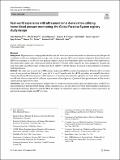Real-world experience with ultrasound renal denervation utilizing home blood pressure monitoring: the Global Paradise System registry study design
Author(s)
Mahfoud, Felix; Azizi, Michel; Daemen, Joost; Sharp, Andrew S. P.; Patak, Atul; Iglesias, Juan F.; Kirtane, Ajay; Fisher, Naomi D. L.; Scicli, Andrea; Lobo, Melvin D.; ... Show more Show less
Download392_2023_Article_2325.pdf (511.0Kb)
Publisher with Creative Commons License
Publisher with Creative Commons License
Creative Commons Attribution
Terms of use
Metadata
Show full item recordAbstract
Abstract
Background
Hypertension is a major public health issue due to its association with cardiovascular disease risk. Despite the availability of effective antihypertensive drugs, rates of blood pressure (BP) control remain suboptimal. Renal denervation (RDN) has emerged as an effective non-pharmacological, device-based treatment option for patients with hypertension. The multicenter, single-arm, observational Global Paradise™ System (GPS) registry has been designed to examine the long-term safety and effectiveness of ultrasound RDN (uRDN) with the Paradise System in a large population of patients with hypertension.
Methods
The study aims to enroll up to 3000 patients undergoing uRDN in routine clinical practice. Patients will be recruited over a 4-year period and followed for 5 years (at 3, 6, and 12 months after the uRDN procedure and annually thereafter). Standardized home BP measurements will be taken every 3 months with automatic upload to the cloud. Office and ambulatory BP and adverse events will be collected as per routine clinical practice. Quality-of-Life questionnaires will be used to capture patient-reported outcomes.
Conclusions
This observational registry will provide real-world information on the safety and effectiveness of uRDN in a large population of patients treated during routine clinical practice, and also allow for a better understanding of responses in prespecified subgroups. The focus on home BP in this registry is expected to improve completeness of long-term follow-up and provide unique insights into BP over time.
Graphical abstract
Global Paradise System registry study design. ABP, ambulatory blood pressure; BP, blood pressure; FU, follow-up; M, month; OBP, office blood pressure.
Date issued
2023-11-09Department
Massachusetts Institute of Technology. Institute for Medical Engineering & SciencePublisher
Springer Berlin Heidelberg
Citation
Mahfoud, Felix, Azizi, Michel, Daemen, Joost, Sharp, Andrew S. P., Patak, Atul et al. 2023. "Real-world experience with ultrasound renal denervation utilizing home blood pressure monitoring: the Global Paradise System registry study design."
Version: Final published version